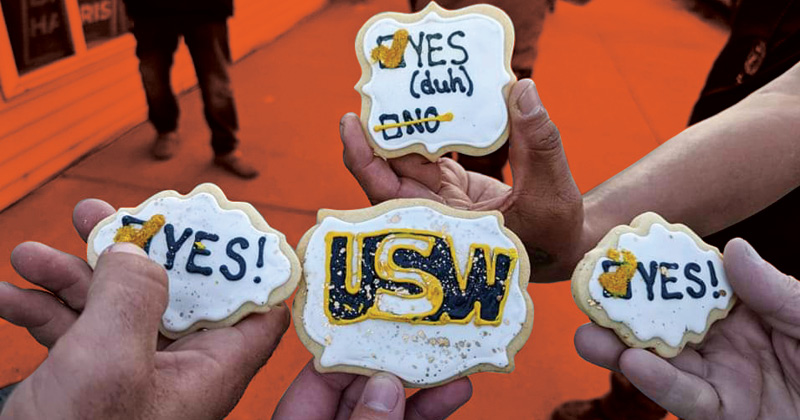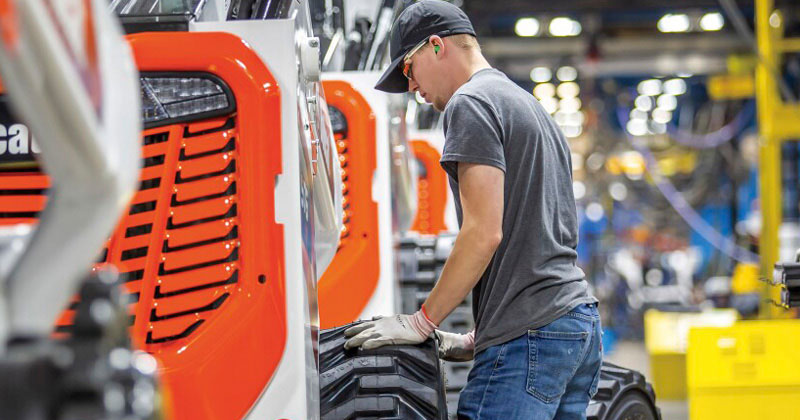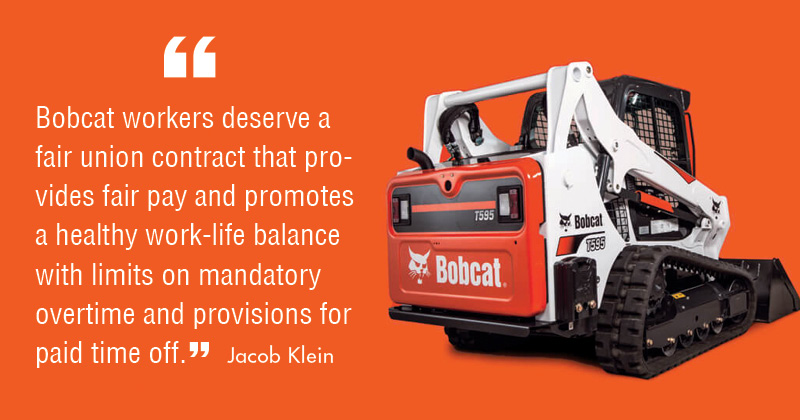
Teiya Hangsleben got involved in the labor movement before she was even old enough to sign a union card. At the age of 12, she started helping her father, a local union officer, write grievances.
So when the USW offered rank-and-file members like Hangsleben the opportunity to be trained as organizers and put those skills to use in workplaces across North America to grow the union, she “jumped at it,” she said.
Hangsleben attended training sessions alongside her USW siblings last spring in Ohio, then hit the ground running over the summer, helping the USW achieve its largest industrial organizing victory in 19 years, bringing 700 members at the Bobcat plant in Bismarck, N.D., into the union.
Rank-and-File
That vote by Bobcat workers last fall was a huge success largely because of the effort, launched a year ago by International President Tom Conway, to bring rank-and-file members onto the union’s organizing staff and ask them to talk to people in shops just like their own, where they can relate directly to their fellow workers about their struggles.
Hangsleben and several other organizers on the campaign came from another Bobcat plant in Gwinner, N.D., just 200 miles southeast of Bismarck, where more than 1,000 USW members work. The workers were able to speak with authority about the union difference because their experiences at work were so similar.

“It was definitely a benefit being from a Bobcat shop,” said Hangsleben, whose father still serves as president of Local 560 in Gwinner. “We were able to relate to them all the more.”
That ability for rank-and-file members to grow the USW ranks through direct conversations with their fellow workers is the key to the USW’s organizing push.
“It’s a genius idea,” Hangsleben said. “You’re going to relate to people better who are just like you. It puts people more at ease and makes them more open to conversations.”
Those conversations came easily for Hangsleben and her co-worker and fellow USW organizer Derrick Anderson.
“We speak the same language. We have the same concerns,” said Anderson, who spent 14 years working in a non-union factory before coming to work at Bobcat. “We know how a union can benefit them, because we live it.”
The grassroots nature of the USW’s organizing plan was a major key to success, members said.
“Some conversations start out cold,” Anderson said. “But then when we say where we are from, they start talking more openly.”
The Bobcat facility in Gwinner has been part of the USW family for nearly 55 years and is well known in the area for being a good place to work thanks in large part to the union.
“We have a long history, so it’s not just a new fad,” Anderson said. “We’re here to stay, and we can say we make your home life, your work life, your whole life better with the union.”
National Trend
The USW victory in Bismarck was part of a national trend that began even before the COVID-19 pandemic. A Gallup poll taken in August showed that 71 percent of Americans hold a positive view of labor unions – the highest level in 57 years.
In addition to the 700 workers in Bismarck, the USW has achieved several other high-profile organizing victories in recent years. In October 2021, 3,400 faculty members at the University of Pittsburgh voted by a nearly 3-to-1 margin to join the Steelworkers, overcoming a relentless anti-union campaign by the administration that lasted years and cost the school millions of dollars.
Elsewhere, interest in unions remains high. More than 6,800 workers at 263 Starbucks locations in the United States have joined unions, and workers at an Amazon warehouse that employs 6,000 people in Staten Island voted last spring to unionize their shop.
Union History
The facility that the USW team was successful in organizing in Bismarck had been unionized in the past before shutting down and reopening without union representation.

“That was pretty personal to us,” Hangsleben said. “That kind of got the fire going in my opinion.”
That fire spread quickly through the Bismarck factory. District 11 Director Emil Ramirez said the employees at the factory recognized that a strong union would provide them with a collective voice on the job and also would empower individual employees, who became closer as a group during the organizing effort.
“As employers continue to urge more and faster production, it is absolutely essential for workers to have a say on issues that could impact their occupational health and safety,” Ramirez said. “Fair pay and benefits will help retain loyal, experienced workers, and ensuring adequate staffing numbers will keep the plant running as safely and efficiently as possible.”
Contract Talks
Now that the work of organizing the facility is behind them, the workers in Bismarck are in the process of bargaining a contract.
“Bobcat workers deserve a fair union contract that provides fair pay and promotes a healthy work-life balance with limits on mandatory overtime and provisions for paid time off,” said new member Jacob Klein. “We are proud to join the United Steelworkers and look forward to the next step of the process — working together to negotiate a fair first collective bargaining agreement.”
Hangsleben said she hopes that the big victory in Bismarck spreads to other non-union facilities in the area so that everyone can reap the benefits of a strong union contract.
“I had a lot of satisfaction when the election results came in,” she said. “You’re not just helping those 700 people. You’re helping those 700, plus their families, as well as future generations.”

